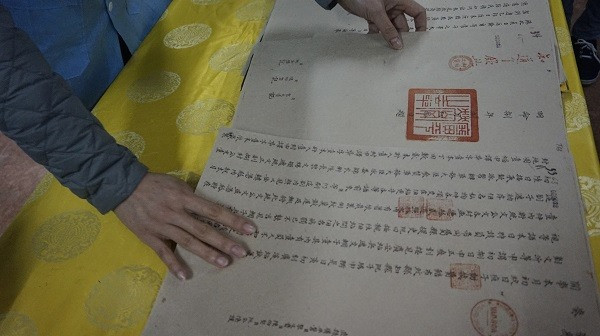Hanoi (VNS/VNA) - Administrative reforms arevery important to the development of a nation, State managers andresearchers agreed during a conference reviewing administrativereforms under the Nguyen Dynasty (1802-1945), reflected through chauban (official administrative papers).
The Ministry of Home Affairs hosted the event in Hanoi late last week withthe aim of acknowledging the value of administrative reforms underthe Nguyen Dynasty.
The panelists discussed what can be learnt from the Kings’ policies and how thereforms continue to influence the country today.
Deputy Minister of Home Affairs Nguyen Trong Thua said "this isthe good chance for us to acknowledge the great contributions of the ancestorsin establishing and developing the country".
“By the way, we also have lessons learnt from administrative reforms inhistory, to apply to today’s society,” he said. “The conference is also a forumto research further and exchange knowledge about the regulations and remarkableachievements of administrative reforms in the history,” said Thua.
Opening the conference, Dang Thanh Tung, head of the State Departmentfor Records and Archives, said at least one administrative reform wasorganised during each dynasty.
Chau ban, including laws, decrees, edicts and instructions forresolving problems in various fields such as politics, military affairs,foreign affairs, economy, society and culture, received the certificate ofthe Asian-Pacific Region’s Memory of the World Programme in 2014. They alsorecorded details of the administrative reforms of the Nguyen Kings.
When King Gia Long (1762-1820) started the Nguyen Dynasty, hemade new policies such as naming the country Vietnam and introducenew seals and currency.
King Minh Mang (1791-1841) released a royal proclamation that ensured studentsof Quoc Tu Giam (a royal college built in 1803 in the imperial city of Hue)would receive allowances to encourage them in their study.
In addition, “thieves who confessed their guilt before being investigated wouldreceive clemency”, wrote the king.
Phan Thanh Hai, Director of the Hue Monuments ConservationCentre, remarked that some policies of King Minh Mang still work in the modernsociety.
For example, he applied the law of hoi ty (a phrase that literarilymeans “keeping away”) in managing mandarins. Accordingly, people who share ablood line or have a close relationship won’t be appointed to the same office.In an exam, if the contestant and the mandarin working at the examinationcompound had a close relationship, one of them had to move to another place.
“The law is still up-to-date nowadays, it prevents corruption and collusion tounfairly benefit a single group,” said Hai.
Nguyen Thu Hoai from the National Archives Centre 1 said King Bao Dai tried tocreate administrative reforms though the country was colonised by the French.
He allowed to open a part of the Royal Citadel to visitors starting in 1938, toshowcase a part of the chau ban for public exhibition in 1943, toname streets after Vietnamese famous people, and to allow Vietnamese workers tohave a day off on May Day.-VNS/VNA





























